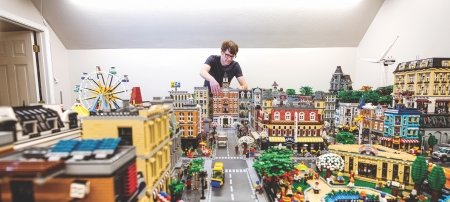Michigan Tech Board of Trustees Authorizes Design of New Student Apartments
At its regular meeting today, Michigan Technological University's Board of Trustees authorized planning and design work for new apartment-style housing for students on the Michigan Tech campus. The $16.5 million construction will add 192 beds.
The new apartments will be built behind West McNair Hall. The University's goal is to complete construction by fall 2010.
Michigan Tech needs additional on-campus housing because enrollment continues to grow, said Les Cook, vice president for student affairs. Already this year, the University is expecting 236 more students than it had in fall 2007
"The University anticipates continued growth, so we must act now to prepare for future housing needs," Cook said.
At Michigan Tech, as nationally, there is a trend toward students preferring to live on campus. Those students seek quality accommodations with apartment-style amenities, he explained. Newly constructed on-campus housing also will include state-of-the-art safety features.
Russell Gronevelt, new chair of the Michigan Tech Board of Trustees, accepted the gavel from the outgoing chair, Kathryn Clark. He welcomed board members to Alumni Weekend, Aug. 7-9, 2008, and announced new committee chairs, including Academic Affairs--Kathryn Clark; Finance and Audit--Stephen Hicks; Presidential Review--Marty Richardson.
After a closed session during which Board members discussed President Glenn D. Mroz's annual performance evaluation, Gronevelt said: "We have concluded that President Mroz is doing an excellent job as president of our University. We appreciate his outstanding leadership and the management team that he has put together and retains. We believe that Michigan Tech is fortunate to have such an exceptional president."
Gronevelt reported on new research funding:
* National Science Foundation, $599,978 to the Michigan Tech Center for Water and
Society, for 18 need-based scholarships for graduate students to explore economic,
social, environmental and international aspects of sustainability.
* University of Alaska Fairbanks, $301,156 to Michigan Tech�s Rail Transportation
Program to develop railroad engineering best practices for areas of deep seasonal
frost and permafrost.
* National Science Foundation has established the Center for Fundamental Studies of
Advanced Sustainable Iron and Steel. The industry-university cooperative research
center will operate as a partnership between Michigan Tech and the University of Utah,
with Michigan Tech serving as the lead institution. Its goal is to improve sustainability
in the iron and steel industry by making maximum use of renewable resources and developing
innovative methods to prevent pollution and reduce emissions while increasing energy
efficiency. Thirteen companies have already committed to participating.
The Board of Trustees approved professor emeritus status for Janice Glime, Martha Janners and Don Lueking, Department of Biological Sciences; Gary Agin, Department of Physics; and Terry Monson, School of Business and Economics.
Michigan Technological University is a leading public research university, conducting research, developing new technologies and preparing students to create the future for a prosperous and sustainable world. Michigan Tech offers more than 120 undergraduate and graduate degree programs in engineering, forestry and environmental sciences, computing, technology, business and economics, natural and physical sciences, arts, humanities and social sciences.
Michigan Technological University is a public research university founded in 1885 in Houghton, Michigan, and is home to more than 7,000 students from 55 countries around the world. Consistently ranked among the best universities in the country for return on investment, Michigan’s flagship technological university offers more than 120 undergraduate and graduate degree programs in science and technology, engineering, computing, forestry, business and economics, health professions, humanities, mathematics, social sciences, and the arts. The rural campus is situated just miles from Lake Superior in Michigan's Upper Peninsula, offering year-round opportunities for outdoor adventure.




Comments